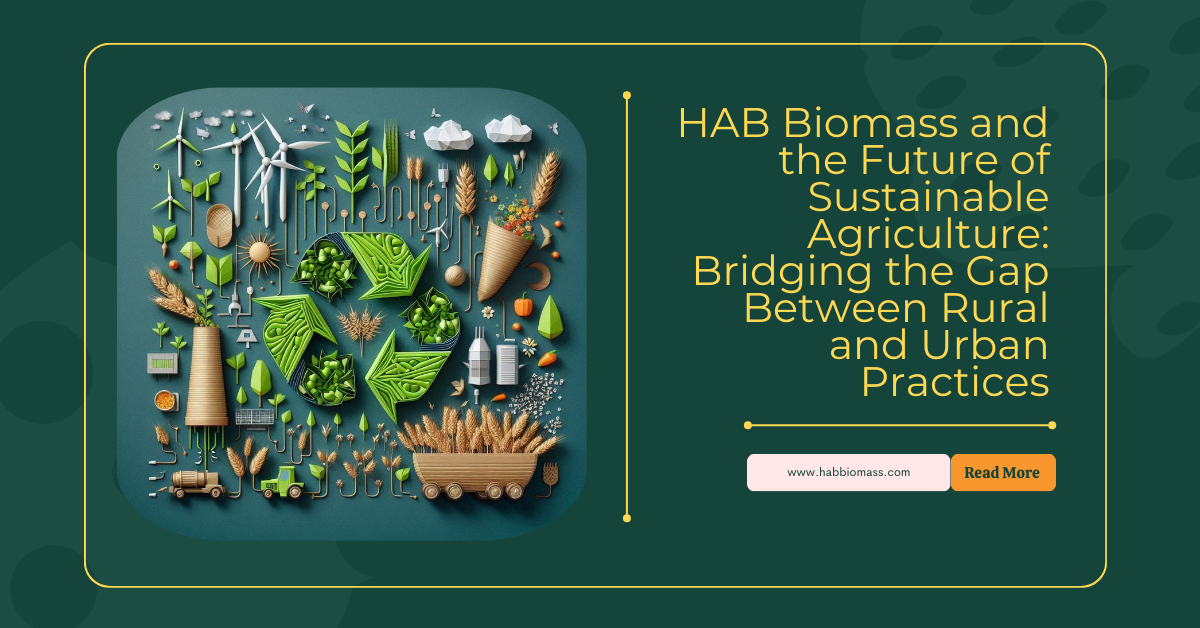Introduction: A New Era of Agriculture
As the world faces unprecedented environmental challenges, the need for sustainable agriculture has never been more urgent. The divide between rural and urban areas, often seen as separate spheres of influence, is beginning to blur as both seek solutions to common environmental problems. In this context, HAB Biomass Pvt. Ltd. is leading the way in uniting rural and urban communities through innovative, eco-friendly practices, particularly with the use of biochar. This approach not only fosters sustainable agriculture but also paves the way for a greener, more resilient planet.
The Challenge: Bridging the Rural-Urban Divide
Rural areas have traditionally been the backbone of agricultural production, supplying the food, fiber, and fuel that sustain urban populations. However, urbanization has brought with it a host of challenges, including pollution, land degradation, and the need for sustainable food systems. As cities grow, the environmental impacts of urban living—such as waste generation, carbon emissions, and resource depletion—have become increasingly apparent. At the same time, rural areas are grappling with soil degradation, loss of biodiversity, and the pressures of climate change.
The challenge lies in finding a way to bridge these two worlds, creating a symbiotic relationship where rural and urban areas work together towards sustainable development. This is where HAB Biomass comes into play, leveraging innovative technologies like biochar to create linkages that benefit both rural and urban communities.
The Solution: Biochar and Sustainable Agriculture
Biochar, a carbon-rich product derived from the pyrolysis of organic waste, has emerged as a powerful tool in sustainable agriculture. Its ability to improve soil health, enhance crop yields, and sequester carbon makes it an invaluable resource for both rural farmers and urban gardeners. By turning agricultural and organic waste into biochar, HAB Biomass is not only addressing waste management issues but also promoting sustainable practices that can be adopted in both rural and urban settings.
In rural areas, biochar is being used to rejuvenate degraded soils, increase water retention, and reduce the need for chemical fertilizers. These benefits are crucial for farmers who are facing the twin challenges of declining soil fertility and increasing climate variability. By incorporating biochar into their farming practices, rural communities can achieve higher productivity while simultaneously contributing to climate change mitigation through carbon sequestration.
In urban areas, the application of biochar in community gardens, green roofs, and urban farms is helping to create more sustainable food systems. Urban agriculture, supported by biochar, offers a way to reduce the carbon footprint of food production, lower urban heat islands, and improve the overall quality of life in cities. The use of biochar in urban settings also provides an opportunity for cities to contribute to global climate goals, by sequestering carbon and reducing greenhouse gas emissions.
Building Rural-Urban Linkages
The integration of biochar into both rural and urban agricultural practices is a significant step towards building stronger rural-urban linkages. By creating a common ground—sustainable agriculture—HAB Biomass is fostering collaboration between these communities, which can lead to shared benefits and mutual growth.
For example, rural areas can supply urban centers with biochar, creating a new economic opportunity for farmers. In turn, urban areas can provide markets for biochar-enhanced products, such as organic fruits and vegetables grown in biochar-rich soils. This exchange not only supports local economies but also contributes to a more sustainable and resilient food system.
Furthermore, the adoption of biochar and other sustainable practices can lead to knowledge sharing and innovation. Rural farmers can learn from urban agricultural techniques, such as vertical farming and hydroponics, while urban growers can benefit from the traditional knowledge and practices of rural farmers. This cross-pollination of ideas can accelerate the development of sustainable agriculture and help both communities adapt to the challenges of climate change.
The Role of HAB Biomass in Sustainable Agriculture
HAB Biomass is at the forefront of this rural-urban collaboration, providing the tools and technologies needed to make sustainable agriculture a reality. Our biochar products are designed to meet the needs of both rural farmers and urban gardeners, offering a versatile solution that can be tailored to different environments and scales of production.
In addition to providing biochar, HAB Biomass is committed to promoting education and awareness about sustainable agriculture. Through workshops, training programs, and partnerships with local communities, we are helping to spread the knowledge and benefits of biochar far and wide. By empowering both rural and urban communities with the tools and knowledge they need, we are fostering a culture of sustainability that transcends geographical boundaries.
Conclusion: A Greener Future for All
The future of agriculture lies in the collaboration between rural and urban communities, united by a shared commitment to sustainability. HAB Biomass is proud to be a catalyst for this change, providing innovative solutions like biochar that bridge the gap between these two worlds. By working together, we can create a greener, more resilient planet, where both rural and urban areas thrive in harmony.
As we move forward, the role of sustainable agriculture in addressing global challenges will only become more critical. With the continued support of HAB Biomass and the adoption of eco-friendly practices like biochar, we can build a future where sustainable agriculture is the norm, not the exception—benefiting both rural and urban communities alike.

